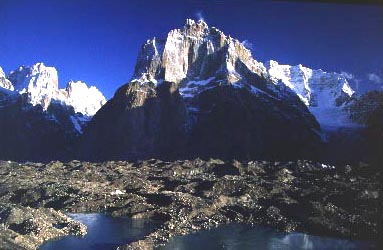Appendix J - Observation of the 1995 K2 Concordia Baltoro Glacier Clean-Up Expedition
July 22, 1995Taleh Mohammad
Deputy Chief Operations Tourism Division
F-7/2, 13 T/U Commercial Sector
Islamabad
Dear Taleh Sahib:
As per your request, here is a report on our observation of the K-2 Concordia Baltoro Glacier clean-up expedition of June 1995, led by Mr. Afzal Sherazi of Adventure Foundation, Pakistan.
Overall, we must say that the clean-up expedition is to be commended for picking up and removing some 31 porter loads, at 25 kg each, of trash. There is too much trash at all campsites and along the trail. This eyesore must be reduced, and through education and clean-up, can be eliminated.
We want to make three additional comments:
- The timing of the clean-up expedition should be changed from June to July. The upper camps on the Baltoro glacier (ie, Goro I & II, Concordia, and Broad Peak and K-2 base camps) are still covered by snow in June. The clean-up expedition this year apparently could not see the trash at those camps. We found a large amount of unremoved trash at those camps.
- The composition of the clean-up team should include several persons from the local Balti community. These persons should participate as co-members. If the Baltoro glacier is ever to become a clean and trash-free place, it will not be because ever year a handful of people from outside Baltistan come for a brief clean-up visit. It is impossible for a limited action to have a permanent or widespread effect on the trash situation. Instead, Balti people, who comprise the majority of the people traveling on the glacier, must become active participants in a continual clean-up process. This can only come about through educating them to the value and practice of cleaning and not littering the glacier. The clean-up expedition is a perfect opportunity to couple effective action with education. We suggest the clean-up expedition plan a one day workshop in Skardu, to be held the day before leaving for the glacier. Balti leaders of the trekking and tourism industry should be invited. Principles of ecologically sound trekking should be explained. The key point is that if trash continues to seriously litter the Baltoro glacier as it presently does, trekkers will be less interested in visiting the glacier. The natural resource capital that provides livelihood for the Balti community will be eroded and they will suffer an economic loss. We suggest that IUCN be requested to help plan and organize the content of this workshop together with the Adventure Foundation Pakistan. By having several Baltis participate in clean up expeditions, practical experience will reinforce the discussions of the workshop. Over time, this education will spread and the larger community in Baltistan will become aware of how they can help to keep the glacier clean each time they go there.
- We want to address a situation that is more problematic than trash. Litter and trash are the easiest problems to solve. It is simply a matter of picking it up and removing it. The problem of human waste, however, is harder to resolve and needs immediate attention. Every camp is surrounded by human feces, and some heavily used camps are hard to approach without stepping in feces. These feces are largely from the multitude of porters who accompany treks and expeditions. This is a long term health hazard and a real stink and eyesore. Adequate and sufficient toilet facilities must be constructed for porters, and porters must be instructed to use them. Also misuse of toilet pits (eg, dumping plastic bags of garbage into them) needs to be stopped. Guides and porter sirdars should be taught to stop this practice. Non-burnable trash must be carried out. Trash in the latrines interferes with decomposition of human waste. Currently, there are two to three cement pit latrines at each campsite. These are not used by porters, who regard them as being for the foreigners only. This number of latrines is insufficient for porter use anyway. There can be anywhere from 100 to 300 people per night at some camps. We suggest meetings with porter sirdars in Skardu to arrive at a workable solution for the feces problem (ie, one that will be low cost, culturally appropriate, and easily sustainable).
This particular problem of human waste disposal is one being faced in all heavily used mountain protected areas. We enclose a photocopy of an article on the subject from Climbing magazine, a leading publication for climbers, for more input of ideas.
Sincerely,John Mock and Kimberley O'Neil
Authors of
cc: Jan Nadir Khan, Adventure Foundation Pakistan; Aban Marker Kabraji, Country Representative, IUCN-Pakistan; Khushal Habibi, Biodiversity Project Director, IUCN; Nazir Sabir and Mohammad Iqbal, MLAs for Northern Areas

